Pride & Procrastination

 My dentist warned me, but I didn’t listen. “A temporary crown,” he said, “is only temporary. Make an appointment to see me in about 30 days; by that time your permanent crown will be ready and we’ll make sure we protect that root canal.” I scheduled my next visit, but a severe storm closed the office the day of the appointment. They called and left several messages, but when you’ve developed the habit of procrastination, it’s pretty easy to not return a call from the dentist. Life got busy, and I forgot his warning. Months passed—18 to be exact. When I finally scheduled the appointment, the news wasn’t good. “A temporary crown can’t protect the tooth from decay, like a permanent one can. Decay has begun, and the situation has been compromised. I can do my best to attach the permanent crown, but at some point this tooth will need to be extracted.” I must have looked confused because he added, “The reason you didn’t feel the effects of the decay, was that we removed the nerve when we did the root canal.” While my dentist felt bad, it wasn’t his fault. My tendency to procrastinate made me responsible. I should have known better.
My dentist warned me, but I didn’t listen. “A temporary crown,” he said, “is only temporary. Make an appointment to see me in about 30 days; by that time your permanent crown will be ready and we’ll make sure we protect that root canal.” I scheduled my next visit, but a severe storm closed the office the day of the appointment. They called and left several messages, but when you’ve developed the habit of procrastination, it’s pretty easy to not return a call from the dentist. Life got busy, and I forgot his warning. Months passed—18 to be exact. When I finally scheduled the appointment, the news wasn’t good. “A temporary crown can’t protect the tooth from decay, like a permanent one can. Decay has begun, and the situation has been compromised. I can do my best to attach the permanent crown, but at some point this tooth will need to be extracted.” I must have looked confused because he added, “The reason you didn’t feel the effects of the decay, was that we removed the nerve when we did the root canal.” While my dentist felt bad, it wasn’t his fault. My tendency to procrastinate made me responsible. I should have known better.
American investor and author of Rich Dad, Poor Dad, Robert Kiyosaki reminds us, “Your future is determined by what you do today, not tomorrow.” The procrastinator gets comfortable believing that tomorrow will provide a better opportunity than today. Then, when tomorrow actually comes, it’s that much easier to wait for the day that follows. Banking on the idea that tomorrow will provide a better opportunity than today reveals our overconfidence. Benjamin Franklin said, “Work while it is called today, for you know not how much you may be hindered tomorrow. One today is worth two tomorrows; never leave that till tomorrow which you can do today.”
Tomorrow rarely provides the opportunities that today does. Jesus said that tomorrow would have troubles all its own. The lesson I learned in the dentist’s chair that day was: While I had chosen to wait, decay had not. It had begun its silent work the moment I had left the office 18 months earlier. What’s true in the dentist’s chair is true in your marriage, church, and community. You may wait, but decay goes to work right away. When you procrastinate, you don’t immediately feel the consequences of putting off what should be done. It’s like a deadened nerve in your tooth. The student that doesn’t turn in an assignment or two doesn’t feel the effects until mid-term grades come out. The nagging pain in his chest doesn’t send the man in his mid-life to the doctor until the heart attack comes. The effects of extra helpings of dessert don’t show up the next morning, they show up the next month.
This gradual decay affects our relationships as well. Jesus said, “If your brother sins against you, go and tell him his fault, between you and him alone. If he listens to you, you have gained your brother.” Jesus chose the present tense for go, not the future tense. He’s saying go immediately. Don’t put it off. There’s a chance you can gain your brother, but that chance decreases exponentially when you wait.
Since communication is the number one reason given for most divorces, there’s a good chance that procrastination has killed more marriages than adultery. The initial conflict, no matter how sticky, is easier to resolve before bitterness has settled in. We find a similar warning in Ephesians: “Do not let the sun go down on your anger, and give no opportunity to the devil.” Eugene Peterson translates that phrase, “Don’t give the Devil that kind of foothold in your life.” In the context of broken communication, procrastination gives Satan an opportunity he otherwise wouldn’t have. Make no mistake about it, he knows how to exploit it.
When my grandmother died, my parents passed her Bible on to me. When I opened it, a small piece of paper fell out. I recognized the handwriting as my grandmother’s. I’d certainly received my share of warnings from her growing up with her right down the street. But this time it was like she was giving one last warning from beyond the grave. The note read: Beware the fire storm. Any trouble you put off until tomorrow will quickly become far worse. Deal with it today. How I wish I had heeded her advice. But I’ve failed to do so enough times that I know firsthand the truth of that warning.
The idea that tomorrow will be better than today is pride’s subtle lie. Frankly, you don’t even know that you have tomorrow, but you do have today. Humility works today and doesn’t make assumptions about tomorrow. James gave this word of warning:
Come now, you who say, “Today or tomorrow we will go into such and such a town and spend a year there and trade and make a profit”—yet you do not know what tomorrow will bring. What is your life? For you are a mist that appears for a little time and then vanishes. Instead you ought to say, “If the Lord wills, we will live and do this or that.” As it is, you boast in your arrogance.
While this passage appears to be describing an overconfident businessman, try viewing it through the lens of a procrastinator. Both the self-assured businessman and the tentative procrastinator have this in common: they are banking on the fact that they have tomorrow. While it may be more subtle on the part of the procrastinator, there is presumption in that thought. His problem is not time; his problem is pride. Until he humbles himself regarding his overconfident optimism, he will continue to put off until tomorrow what he could have done today. But in truth, we don’t know what tomorrow holds, so we should make a humble investment in tomorrow by being diligent today.
Taken from Taking Back Time: biblical strategies for overcoming procrastination
